山东省枣庄市薛城区2017-2018学年高一下学期期中考试英语试题 Word版含答案
文档属性
| 名称 | 山东省枣庄市薛城区2017-2018学年高一下学期期中考试英语试题 Word版含答案 | 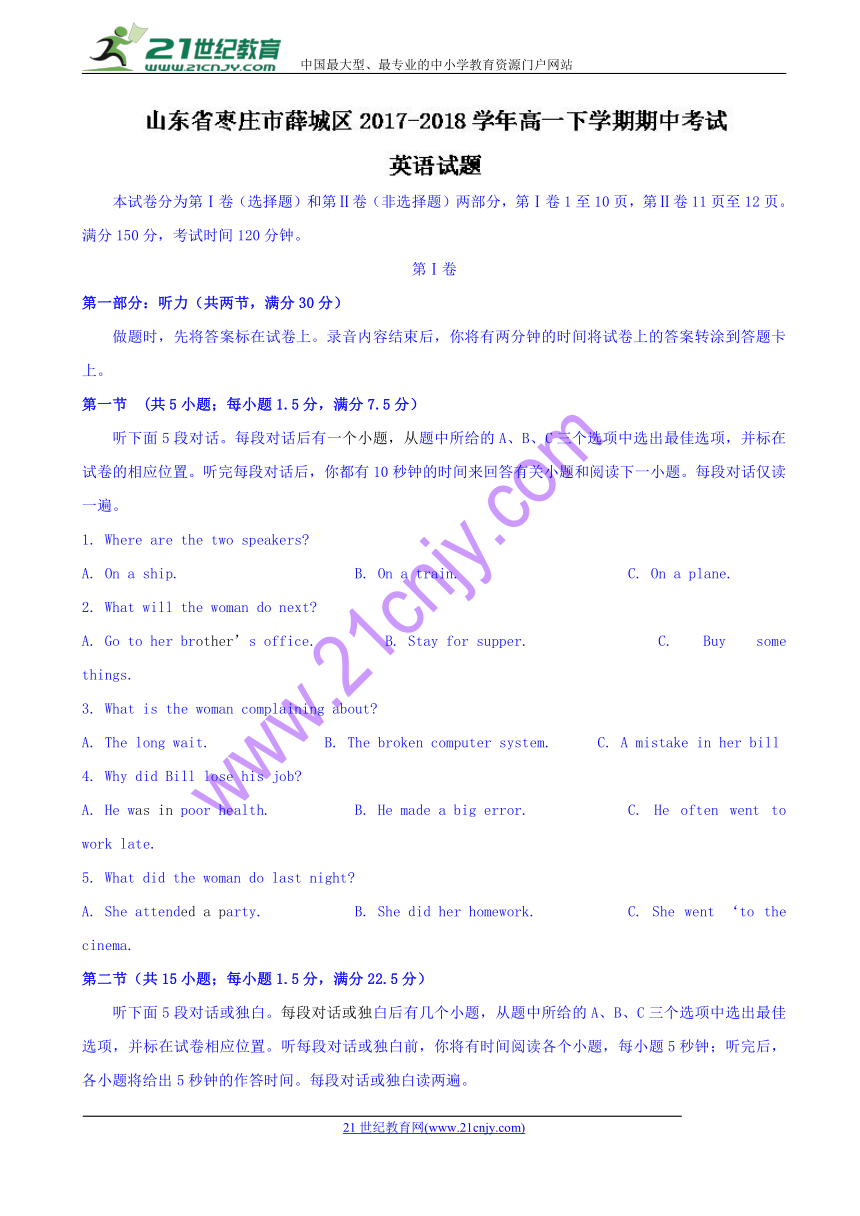 | |
| 格式 | zip | ||
| 文件大小 | 142.9KB | ||
| 资源类型 | 教案 | ||
| 版本资源 | 外研版 | ||
| 科目 | 英语 | ||
| 更新时间 | 2018-05-08 17:29:20 | ||
图片预览

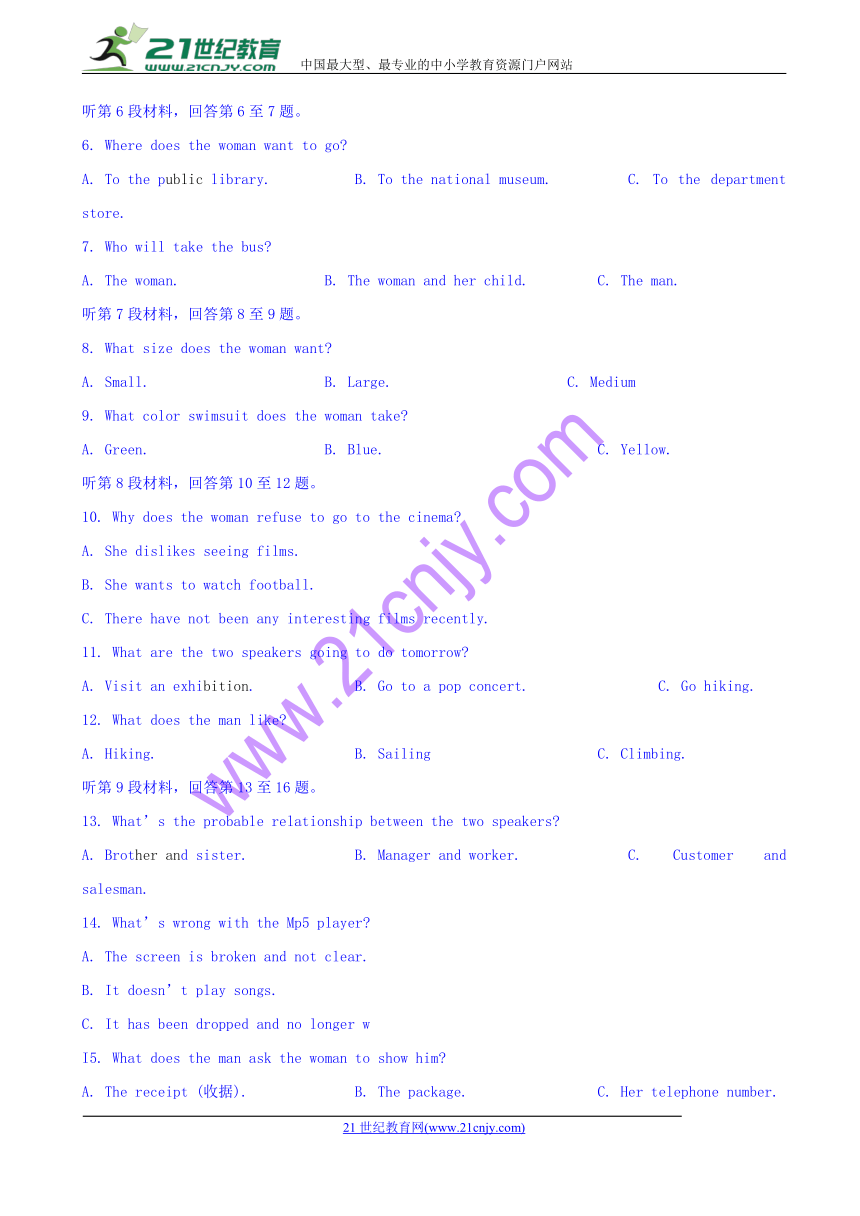
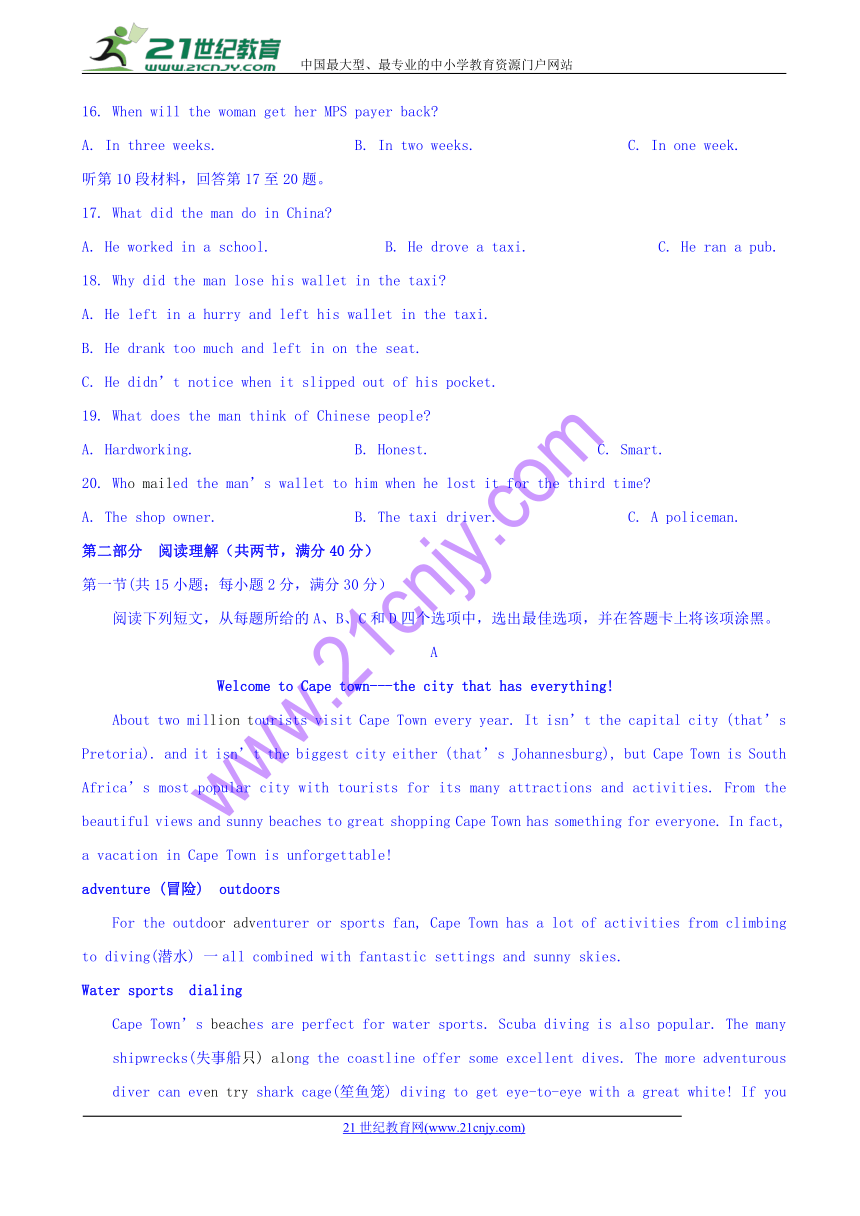
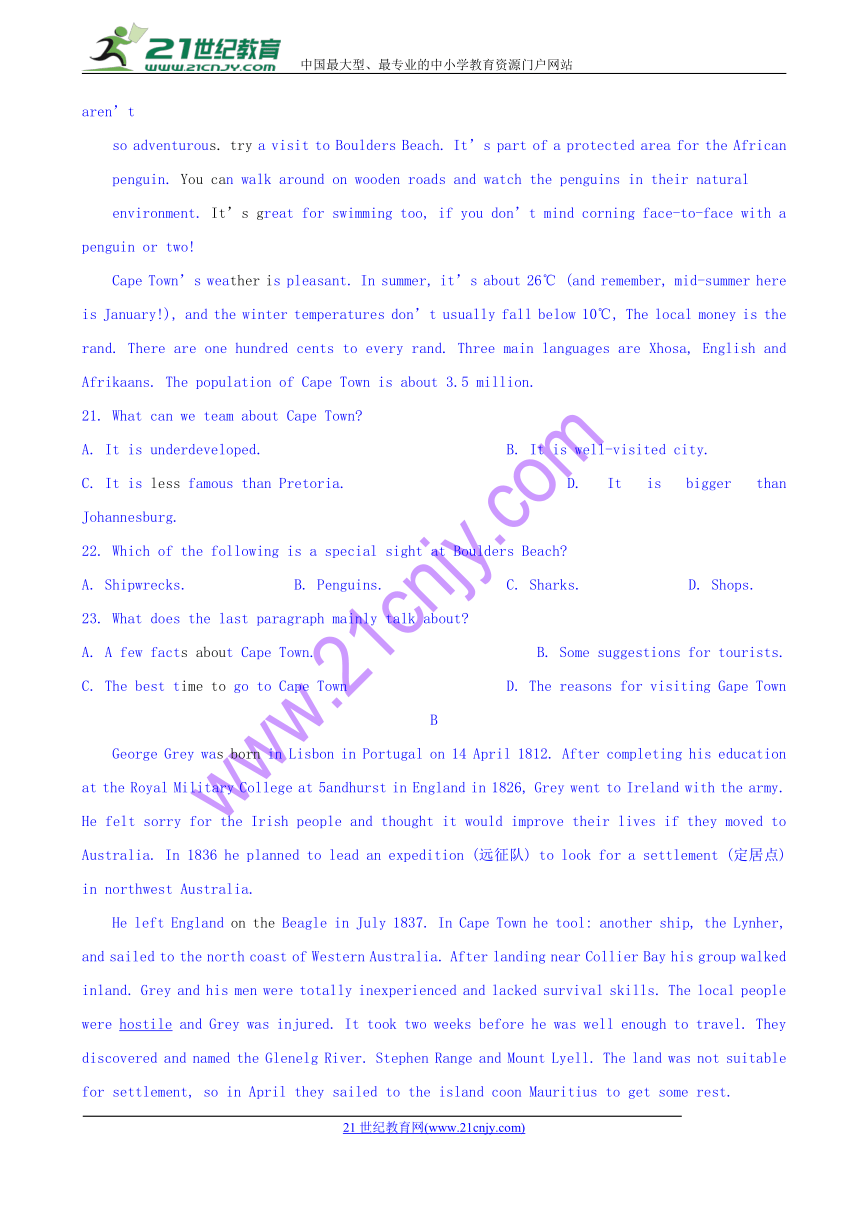
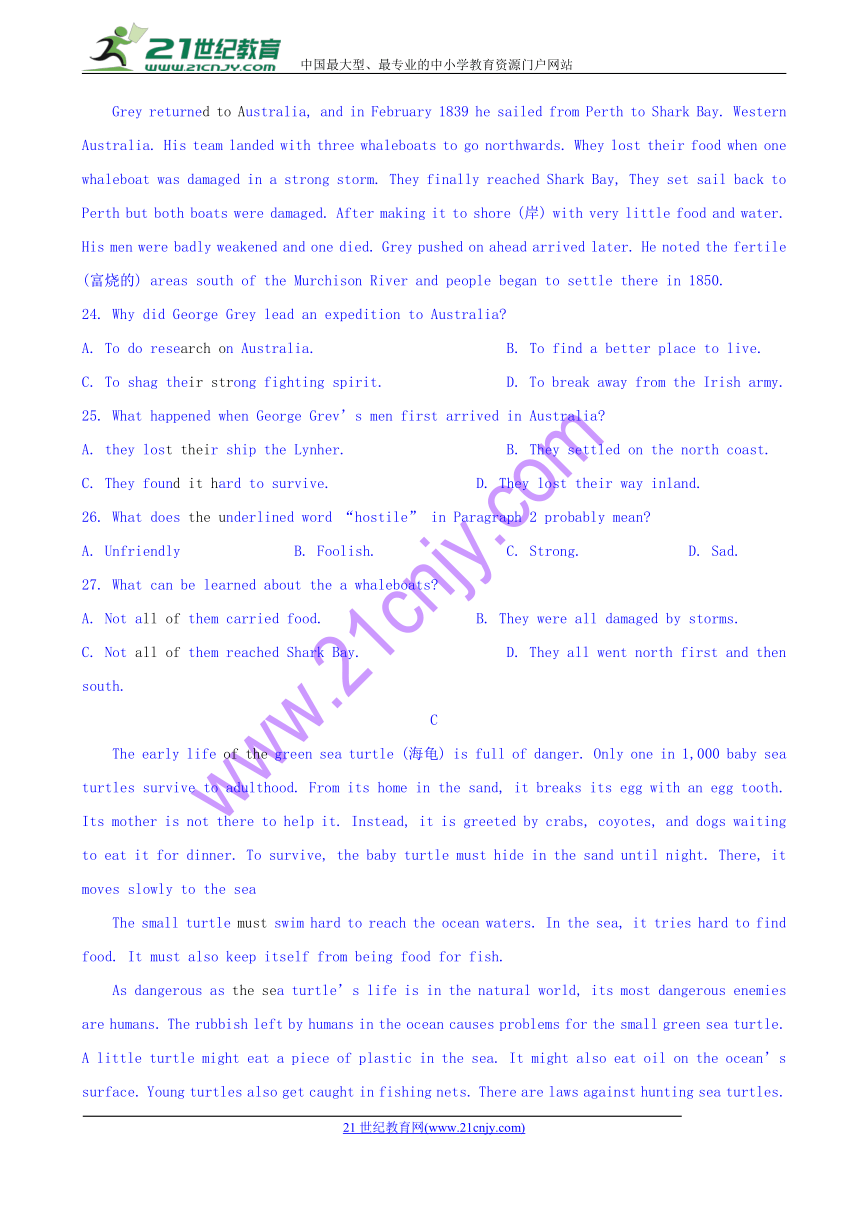
文档简介
本试卷分为第Ⅰ卷(选择题)和第Ⅱ卷(非选择题)两部分,第Ⅰ卷1至10页,第Ⅱ卷11页至12页。满分150分,考试时间120分钟。
第Ⅰ卷
第一部分:听力(共两节,满分30分)
做题时,先将答案标在试卷上。录音内容结束后,你将有两分钟的时间将试卷上的答案转涂到答题卡上。
第一节 (共5小题;每小题1.5分,满分7.5分)
听下面5段对话。每段对话后有一个小题,从题中所给的A、B、C三个选项中选出最佳选项,并标在试卷的相应位置。听完每段对话后,你都有10秒钟的时间来回答有关小题和阅读下一小题。每段对话仅读一遍。
1. Where are the two speakers?
A. On a ship. B. On a train. C. On a plane.
2. What will the woman do next?
A. Go to her brother’s office. B. Stay for supper. C. Buy some things.
3. What is the woman complaining about?
A. The long wait. B. The broken computer system. C. A mistake in her bill
4. Why did Bill lose his job?
A. He was in poor health. B. He made a big error. C. He often went to work late.
5. What did the woman do last night?
A. She attended a party. B. She did her homework. C. She went ‘to the cinema.
第二节(共15小题;每小题1.5分,满分22.5分)
听下面5段对话或独白。每段对话或独白后有几个小题,从题中所给的A、B、C三个选项中选出最佳选项,并标在试卷相应位置。听每段对话或独白前,你将有时间阅读各个小题,每小题5秒钟;听完后,各小题将给出5秒钟的作答时间。每段对话或独白读两遍。
听第6段材料,回答第6至7题。
6. Where does the woman want to go?
A. To the public library. B. To the national museum. C. To the department store.
7. Who will take the bus?
A. The woman. B. The woman and her child. C. The man.
听第7段材料,回答第8至9题。
8. What size does the woman want?
A. Small. B. Large. C. Medium
9. What color swimsuit does the woman take?
A. Green. B. Blue. C. Yellow.
听第8段材料,回答第10至12题。
10. Why does the woman refuse to go to the cinema?
A. She dislikes seeing films.
B. She wants to watch football.
C. There have not been any interesting films recently.
11. What are the two speakers going to do tomorrow?
A. Visit an exhibition. B. Go to a pop concert. C. Go hiking.
12. What does the man like?
A. Hiking. B. Sailing C. Climbing.
听第9段材料,回答第13至16题。
13. What’s the probable relationship between the two speakers?
A. Brother and sister. B. Manager and worker. C. Customer and salesman.
14. What’s wrong with the Mp5 player?
A. The screen is broken and not clear.
B. It doesn’t play songs.
C. It has been dropped and no longer w
I5. What does the man ask the woman to show him?
A. The receipt (收据). B. The package. C. Her telephone number.
16. When will the woman get her MPS payer back?
A. In three weeks. B. In two weeks. C. In one week.
听第10段材料,回答第17至20题。
17. What did the man do in China?
A. He worked in a school. B. He drove a taxi. C. He ran a pub.
18. Why did the man lose his wallet in the taxi?
A. He left in a hurry and left his wallet in the taxi. 21*cnjy*com
B. He drank too much and left in on the seat.
C. He didn’t notice when it slipped out of his pocket. 【出处:21教育名师】
19. What does the man think of Chinese people?
A. Hardworking. B. Honest. C. Smart.
20. Who mailed the man’s wallet to him when he lost it for the third time?
A. The shop owner. B. The taxi driver. C. A policeman.
第二部分 阅读理解(共两节,满分40分)
第一节(共15小题;每小题2分,满分30分)
阅读下列短文,从每题所给的A、B、C和D四个选项中,选出最佳选项,并在答题卡上将该项涂黑。
A
Welcome to Cape town---the city that has everything!21教育网
About two million tourists visit Cape Town every year. It isn’t the capital city (that’s Pretoria). and it isn’t the biggest city either (that’s Johannesburg), but Cape Town is South Africa’s most popular city with tourists for its many attractions and activities. From the beautiful views and sunny beaches to great shopping Cape Town has something for everyone. In fact, a vacation in Cape Town is unforgettable!
adventure (冒险) outdoors
For the outdoor adventurer or sports fan, Cape Town has a lot of activities from climbing to diving(潜水) 一all combined with fantastic settings and sunny skies.
Water sports dialing
Cape Town’s beaches are perfect for water sports. Scuba diving is also popular. The many
shipwrecks(失事船只) along the coastline offer some excellent dives. The more adventurous
diver can even try shark cage(笙鱼笼) diving to get eye-to-eye with a great white! If you aren’t
so adventurous. try a visit to Boulders Beach. It’s part of a protected area for the African
penguin. You can walk around on wooden roads and watch the penguins in their natural
environment. It’s great for swimming too, if you don’t mind corning face-to-face with a penguin or two!2-1-c-n-j-y
Cape Town’s weather is pleasant. In summer, it’s about 26℃ (and remember, mid-summer here is January!), and the winter temperatures don’t usually fall below 10℃, The local money is the rand. There are one hundred cents to every rand. Three main languages are Xhosa, English and Afrikaans. The population of Cape Town is about 3.5 million.www-2-1-cnjy-com
21. What can we team about Cape Town?
A. It is underdeveloped. B. It is well-visited city.
C. It is less famous than Pretoria. D. It is bigger than Johannesburg.
22. Which of the following is a special sight at Boulders Beach?
A. Shipwrecks. B. Penguins. C. Sharks. D. Shops.
23. What does the last paragraph mainly talk about?
A. A few facts about Cape Town. B. Some suggestions for tourists.
C. The best time to go to Cape Town D. The reasons for visiting Gape Town
B
George Grey was born in Lisbon in Portugal on 14 April 1812. After completing his education at the Royal Military College at 5andhurst in England in 1826, Grey went to Ireland with the army. He felt sorry for the Irish people and thought it would improve their lives if they moved to Australia. In 1836 he planned to lead an expedition (远征队) to look for a settlement (定居点) in northwest Australia.【来源:21·世纪·教育·网】
He left England on the Beagle in July 1837. In Cape Town he tool: another ship, the Lynher, and sailed to the north coast of Western Australia. After landing near Collier Bay his group walked inland. Grey and his men were totally inexperienced and lacked survival skills. The local people were hostile and Grey was injured. It took two weeks before he was well enough to travel. They discovered and named the Glenelg River. Stephen Range and Mount Lyell. The land was not suitable for settlement, so in April they sailed to the island coon Mauritius to get some rest.
Grey returned to Australia, and in February 1839 he sailed from Perth to Shark Bay. Western Australia. His team landed with three whaleboats to go northwards. Whey lost their food when one whaleboat was damaged in a strong storm. They finally reached Shark Bay, They set sail back to Perth but both boats were damaged. After making it to shore (岸) with very little food and water. His men were badly weakened and one died. Grey pushed on ahead arrived later. He noted the fertile (富烧的) areas south of the Murchison River and people began to settle there in 1850.
24. Why did George Grey lead an expedition to Australia?
A. To do research on Australia. B. To find a better place to live.
C. To shag their strong fighting spirit. D. To break away from the Irish army.
25. What happened when George Grev’s men first arrived in Australia?
A. they lost their ship the Lynher. B. They settled on the north coast.
C. They found it hard to survive. D. They lost their way inland.
26. What does the underlined word “hostile” in Paragraph 2 probably mean?
A. Unfriendly B. Foolish. C. Strong. D. Sad.
27. What can be learned about the a whaleboats?
A. Not all of them carried food. B. They were all damaged by storms.
C. Not all of them reached Shark Bay. D. They all went north first and then south.
C
The early life of the green sea turtle (海龟) is full of danger. Only one in 1,000 baby sea turtles survive to adulthood. From its home in the sand, it breaks its egg with an egg tooth. Its mother is not there to help it. Instead, it is greeted by crabs, coyotes, and dogs waiting to eat it for dinner. To survive, the baby turtle must hide in the sand until night. There, it moves slowly to the sea
The small turtle must swim hard to reach the ocean waters. In the sea, it tries hard to find food. It must also keep itself from being food for fish.
As dangerous as the sea turtle’s life is in the natural world, its most dangerous enemies are humans. The rubbish left by humans in the ocean causes problems for the small green sea turtle. A little turtle might eat a piece of plastic in the sea. It might also eat oil on the ocean’s surface. Young turtles also get caught in fishing nets. There are laws against hunting sea turtles. Still, many are hunted, both for their meat and for their shells(壳). All of these dangers must be prevented.
Sea turtles that do survive to grow into adulthood go through many changes. For example, adult green sea turtles weigh about 500 pounds. They stop eating jellyfish and other meat and eat only plants. And they may plan a trip to go back home again. A mother sea turtle goes back to the beach where she was born. This is the only place where she will lay eggs. Even if it has been forty years since she was a baby, she always knows her way back home.
28. Why do baby turtles move to the sea at night?
A. They dislike sunshine. B. They need to avoid enemies.
C. They can find food easily then. D. They prefer lower temperatures.
29. 41}hat does the author think of the sound turtles in Paragraph 3?
A. Pitiful. B. Careless. C. Interesting. D. Courage’s,
30. What can n e learn about sea turtles?
A. They mainly feed on fish and meat.
B. They can live for around forty years.
C. They always produce eggs at their birth places.
D. They visit their beach homes several times a year.
31. What is the text mairtl4 about?
A. The homes of green sea turtles. B. Haw sea turtles find their food.
C. The dancers faced by sea turtles. D. How young turtles became adults.
D
Self-driving cars might make your future travel a lot more pleasant, but they won’t reduce traffic.
Car producers have mentioned that traffic reduction is one of the many advantages of having self-driving cars on the road. The idea is that self-driving cars will reduce accidents caused by human mistakes. But experts say self-driving cars influence on traffic will probably be bad.
Leo Fulton, a co-director at UC Davis’ Institute of Transportation Studies (ITS), said that self-driving cars won’t fix traffic problems unless a pricing(定价) system is put in place that discourages self-driving cars. For example, many companies are interested in programming self-driving cars to do something, which could increase traffic on the road. Fulton said.
Massachusetts lawmakers have already suggested introducing a tax(税) on driverless cars. It calls for at least $0.025 per mile.
Traffic jams(堵塞) could also worsen as companies like Lucid Motors try to produce self-driving cars with reclining seats(可躺座椅). People may choose to live farther outside of cities if they can travel in cars that allow them to sleep and relax. But that increases the number of people travelling in and out of cities during rush hour. Fulton said.21cnjy.com
Without the cost of a driver, Fulton said he worries self-driving Ubers or Lyfts will become so cheap it will be hard to push people to choose car-sharing services like uberPOQL. “i think it’s going to take some kind of pricing system that discourages cars without a single passenger,” he said.www.21-cn-jy.com
Some cities have already started programmes that discourage people from taking car trips alone. For example. Chicago and New York City have set up lanes(车道) that single- passenger cars must pay some money to use. That money increases during rush hour.
32. What do car producers think of self-driving cars?
A. They are safe. B. They are fast.
C. They save buyers money. D. They increase traffic slighth
33. What do Massachusetts lawmakers suggest?
A. Introducing a tax on car producers.
B. Increasing the selling price of sell=driving cars.21教育名师原创作品
C. Pushing up the running casts of self-driving cars.
D. Calling for drivers to avoid travelling during rush hour.
34. What will happen if there are self-driving cars with reclining seats?
A. More people will live in city centres.
B. People o ill spend less money on transport.
C. People are likely to travel longer distances.
D. There will be lighter traffic during rush hour
35. What’s the best title for the text?
A. What cars will we drive in the future?
B. Where will we travel with self-driving cars?
C. How can self-driving cars solve traffic problems?
D. Why self-driving cars could be terrible for traffic?
第二节 (共5小题;每小题2分,满分10分)
根据短文内容,从短文后的选项中选出能填入空白处的最佳选项。选项中有两项为多余选项。(注意:在涂卡时,E涂为AB,F涂为AC,G涂为AD)
Too much information
Computers and cell phones let people communicate with each other by voice or text
anytime, anywhere. The result: too much information! So let me offer these tips(提示) to help
you deal with it.
Tip l— Stick to a schedule(日程表). 17o you have a calendar(日历)? Use it to schedule study times and meetings. How about also using it to schedule quiet time? 36 Then stick to it!
Tip 2— Teat or phone call? Texts are great for shoe messages, but not for long messages. Phone calls are fine when you want a more personal touch, but not when you need to save information about a conversation. 37 21世纪教育网版权所有
Tip 3 Let it ring. You don’t have to answer every phone call. If you don’t want to talk, screen your calls and let the caller leave a message. 38 The same is true for text messages.
Tip 4— 39 After you’ve answered an email, delete(删除) it --- or file(把…归档) it. If you need to save an email, create folders --- for school, for work, for friends. Find a way to organize your messages that works for you, and follow it.
Tip 5— 40 If you belong to(属于) a social network site, are all your “friends” on the site real friends, or are some just strangers? Limit the number of “friends” on your social network, and you will limit communication overload(过多).
A. Or tum off your phone,
B. Keep your inbox(收件箱) empty.
C. Choose your friends carefully.
D. Pick different kinds of social network sites.
E. In those cases, an email or a letter may be better.
F. Check y our cell phones and computers more frequently.
G. Thai is, set aside(留出) time for no email no texts, no phone calls, nothing!
第三部分 语言知识运用(共两节,满分45分)
第一节 完形填空(共20小题;每小题1.5分,满分30分)
阅读下面短文,从短文后各题所给的四个选项(A、B、C和D)中,选出可以填入空白处的最佳选项,并在答题卡上将该项涂黑。21*cnjy*com
Holly’s dad kept homing pigeons(信鸽) in the back garden. She loved the pigeons 41 her favorite was Charlie.
Dad’s homing pigeon club was to hold its first race, and all of his birds were in training. On the day of the 42 , Dad had to drive 100 kilometres to the starting point. Dad whistled (吹口哨) as he 43 along the road. 44 , a dog ran out in front of the car! Dad changed direction to 45 it, but the car skidded (打滑) across the road and into a large tree.
Dad tried to 46 , but his legs were stuck. He had to get 47 as soon as possible. No one had seen the accident, so it might have been hours before he was 48 . He felt around for his phone, but it had been thrown out of reach.
Dad 49 to turn around to check that the pigeons hadn’t been 50 . They seemed all right. Then a great 51 came to him. One of the pigeons could carry a message home to Mum and Holly!
52 , Dad had a pen and a notebook in his pocket. He 53 Charlie, lifted him out and tied the message to Charlie’s leg.
“Fly home, Charlie,” he called.
Charlie set off towards his home and reached the 54 at last.
“Mum!” Holly called “Charlie’s home! And he’s carrying a 55 !”
Mum came out to the backyard. As she read the note, she cried, “Oh no! Dad’s had a(n) 56 !” Mum ran into the house, phoned the emergency (紧急事件) number and 57 what had happened. Soon, Mum came out to the backyard 58 and called , “They’ve 59 Dad, Holly, and he’s going to be all right.”
“You 60 Dad!” Holly told Charlie. “You’re the best pigeon in the world!”
41. A. or B. so C. and D. for
42. A. race B. training C. trade D. meeting
43. A. walked B. ran C. drove D. flew
44. A. Immediately B. Suddenly C. Finally D. Lately
45. A. stop B. control C. keep D. miss
46. A. cry B. call C. move D. talk
47. A. advice B. help C. sleep D. money
48. A. remembered B. protected C. discovered D. understood
49. A. learned B. agreed C. continued D. managed
50. A. caught B. hurt C. shot D. followed
51. A. idea B. dog C. deal D. pigeon
52. A. Strangely B. Naturally C. Honestly D. Luckily
53 A. depended on B. reached for C. waited for D. thought of
54. A. back garden B. club C. starting point D. hospital
55. A. pen B. notebook C. message D. leaf
56. A. car B. accident C. competition D. phone
57. A. realized B. imagined C. explained D. wondered
58. A. once B. then C. again D. first
59. A. found B. described C. taught D. warned
60. A. corrected B. trusted C. recognized D. saved
第Ⅱ卷
第三部分 语言知识运用(共三节,满分45分)
第二节 单词拼写(共10小题;每小题1分,满分10分)
根据下列各句中所给的汉语释义,写出单词的正确形式。(每空1词)
61. Who are the men who really (统治)in this country?
62. The idea is that Italy is the birthplace of European (文明).
63. (测量)the floor area of the greenhouse and divide it by six.
64. (贫穷)is less of a problem now than it used to be.
65. The break-in had (发生)just before midnight.
66. (幸运的是), I’d noticed where you left the car.
67. There is a/an (紧急的)need for food and water.21·世纪*教育网
68. Why not stop them from (污染)the river?
69. To be (诚实的), the house is not quite our style.
70. He is writing a (历史的)novel about nineteenth-century France.
第三节 (共10小题;每小题1.5分,满分15分)
阅读下面短文,在空白处填入适当的内容(1个单词)或括号内单词的正确形式。
While driving 30 children home after school one afternoon, one bus driver from Kansas City 71 (notice) smoke coming from the engine.
“I just immediately knew something was wrong,” driver D’ Anthony Gildon said. The bus caught tire quickly, and he knew he had to do something to lead all 30 kids to 72 (safe).
“For a few 73 (second ), I was really nervous because it was the first time I had been in such 74 situation. I called the base(基地) and told them about the smoke,” Gildon said. When the fire destroyed the front of the bus. Gildon had no choice but 75 (stay) calm since all the kids were 76 (frighten).
“When I told them we had to evacuate(撒离) because of the fire, everybody ran towards the middle.” Gildon said. Then he shouted to a student 77 was sitting at the back of the bus, to open the emergency bank door and lead the kids off the bus.
“ 78 (walk) from the front to the back. I was looking at each seat and under each seat,” said Gildon, who is now considered 79 a hero. “I’m just glad I got everyone out 80 (final),” he said.
第四部分 写作(百强校英语解析团队专供)(共两节,满分25分)
第一节 汉译英(共5小题;每小题3分,满分15分)
用所给的单词或短语,将下列句子译成英语。
81. 每一份合同都有老板的签名。
82. 截止到去年夏末,大量降雨造成了几次洪水泛滥。
83. 在沙尘暴的天气里驾车很危险。
84. 马云是个有着新颖独特思想的人。(Jack Ma, new and special)
85. 孩子们试着靠近史密斯先生,那个让他们害怕的人。(be afraid of)
第二节 短文改错(百强校英语解析团队专供)(共10小题;每小题1分,满分10分)
假定英语课上老师要求同桌之间交换修改作文,请你修改同桌写的以下作文。文中共有10处语言错误,每句中最多有两处。每处错误仅涉及一个单词的增加、删除或修改。21·cn·jy·com
增加:在缺词处加一个漏字符号(∧),并在其下面写出该加的词。
删除:把多余的词用斜线()划掉。
修改:在错的词下划一横线,并在该词下面写出修改后的词。
注意:1.每处错误及其修改均仅限一词;
2.只允许修改10处,多者(从第11处起)不计分。
Dear Mr. and Mrs. Johnson,
I’m writing to you from my home in China. I returned a1 home safe and sound. When I think of the wonderful two weeks I spend in Australia, I just can’t help think of both of you. It was so kind for you to have provided everything to make my stay here pleasant. It was a happy and luck experience. Not only has my English improved and I’ve also teamed so much about your culture. And I enjoyed all the funs we shared together. Thank you very much. I’ll always remember your kind as well as this trip.【来源:21cnj*y.co*m】
I’ll keep touch with you and write to you later. Please take care!【版权所有:21教育】
Yours
Li Ming
山东省枣庄市薛城区2017-2018学年高一下学期期中考试
英语试题
第一部分 听力(共两节,每小题1.5分,满分30分)
1—5 CCABC 6—10 CBCCC 11—15 ABCBA 16—20 BACBA
第二部分 阅读理解(共两节,满分40分)
第一节(共15小题;每小题2分,满分30分)
21-23 BBA 24-27 BCAC 28-31 ACCD 32-35 ACCD
第二节(共5小题;每小题2分,满分10分)
36—40 GEABC
第三部分 语言知识运用(共三节,满分45分)
第一节 完形填空(共20小题;每小题1.5分,满分30分)
41—45 CACBD 46—50 CBCDB 51—55 ADBAC 56—60 BCCAD
第二节:单词拼写(共10小题;每小题1分,满分10分)
61. govern 62. civilization 63. Measure 64. Poverty 65. occurred2·1·c·n·j·y
66. Luckily/Fortunately 67. urgent 68. Polluting 69. honest 70. historical
第三节 语法填空(共10小题;每小题1.5分,满分15分)
71. noticed 72. safety 73. seconds 74. a 75. To stay
76. frightened 77. who 78. Walking 79. as 80. finally
第四部分 写作
第一节 汉译英 (共5小题;每小题3分,共15分)
81. Each agreement/contract is signed by the boss.
82. By the end of last summer, several floods had been caused by heavy rainfalls.
83. It is dangerous to drive in a sandstorm.
84. Jack Ma is a man whose ideas are new and special.
85. The ids/children tried getting close to Mr. Smith, of whom they were afraid.
第二节 短文改错(共10小题;每小题1分,满分10分)
86. I returned at 中的at去掉 87. spend→spent 88. think→thinking或者think前加but
89. for→of 90. here→there 91. luck→lucky 92. and→but
93. funs→fun 94. Kind→kindness 95. keep∧in
同课章节目录
